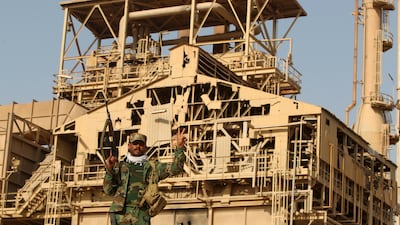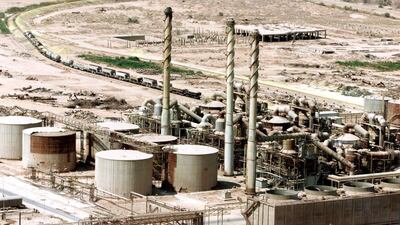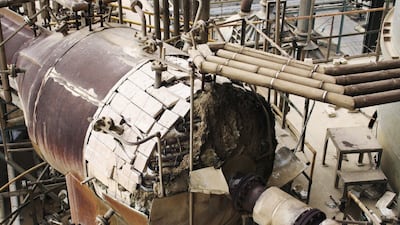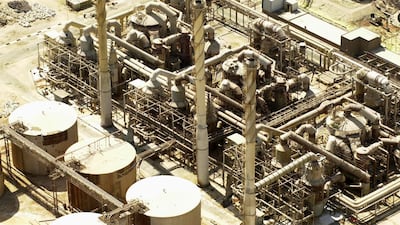Fertiliser prices have soared to new highs due to Russia's war in Ukraine, with the “big three” — phosphates, nitrates and potassium fertilisers — on average doubling since last year, reaching levels not seen since the 2008 commodity boom.
At that time, the price of diammonium phosphate (DAP), the world’s most commonly used fertiliser, rose nearly five-fold between early 2007 and 2008, from about $250 a tonne to more than $1,200.
Iraq, whose fertiliser production and exports soared in the 1970s and 80s, missed out on reaping the benefits of that global fertiliser boom. It was a missed opportunity to help the country move away from risky dependence on volatile oil revenue and boost its once thriving agriculture sector.
The latest increase, caused in part by a disruption of supplies from Russia and surging input costs, is another opportunity that Iraq is likely to struggle to capitalise on.
A reconstruction dream
Agriculture experts involved in Iraq’s reconstruction after the 2003 US-led invasion had hoped the country could cash in on fertiliser demand and create vital jobs.
This would revive the industry built up between the late 1960s and the start of the 1980s, when Iraq paid foreign contractors including Japan's Mitsubishi, US company MW Kellogg and Belgium firm Sybetra, among others, to build large factories and mines to extract raw materials and process them into fertiliser, including a factory in Baiji northern Iraq, the Akashat phosphate mine and processing plant for fertiliser in Anbar province, and another large site at Khor Al Zubeir in Basra.
Together, the facilities would turn Iraq into a fertiliser powerhouse, meeting domestic demand that would soar above two million tonnes, with room for millions of tonnes for export.
Iraq also had a critical advantage: producing fertiliser requires a great deal of energy and the country is rich in inputs for production, especially natural gas.
But the plants fell into disrepair as Iraq’s economy collapsed under sanctions following its invasion of Kuwait in 1990. Hopes that they could be revitalised after 2003 have yet to be realised.
ISIS destruction
Nineteen years after the US invasion and the subsequent war with ISIS, Iraq's Ministry of Industry and Minerals is picking up the scraps of this dream.
When the terror group took over large parts of the country, it destroyed fertiliser production plants — two of which were in the process of being rebuilt following more than two decades of conflict.
A failure to attract foreign investors, largely due to bureaucracy and concerns about corruption, has delayed new projects needed to revive Iraq as a fertiliser exporter.
The fragile security situation following the war with ISIS, combined with a plunge in oil prices during the conflict, left Iraq’s largest phosphate mines in Anbar and the nearby sprawling industrial complex at Al Qaim idle, said Wajdi Al Rawi, spokesman for the state-owned General Phosphate Company.
“The phosphate company is going through difficult times,” Mr Al Rawi told The National.
He said peak production was in 1991, with about two million tonnes of all kinds of fertilisers produced — almost equivalent to Iraq's current demand.
Much of its production was exported to countries including the Gulf states, with the revenue supplying 17 per cent of the national budget, he said.
But the complex became a target for the US-led international coalition in the 1991 Gulf War to drive Saddam Hussein’s army out of Kuwait.
“That attack was a heavy one; it damaged about 60 per cent of the complex,” Mr Al Rawi said.
“Operations resumed later, but we couldn’t export and the production was barely covering 30 to 40 per cent of the local demand.”
The situation continued until the 2003 invasion that toppled Saddam.
“Then, it was also hit by an air strike but that left minor damages,” Mr Al Rawi said.
Reconstruction stalls
Efforts to rebuild the Akashat mine and processing plant point to the struggle Iraq has faced since 2003.
Production was barely 10 per cent of its peak output — about 200,000 tonnes — in 2003 but had collapsed to only 500 tonnes by 2006 as insurgents and US and allied Iraqi forces fought for control of Anbar.
The security situation hampered the supply of raw materials, including sulphuric acid from Mishraq near Mosul, an industrial facility that was also destroyed twice — after 2003 and during the war against ISIS.
A railway dedicated to the site fell into disrepair and there was not enough electricity to keep industrial processes going, a US State Department cable said in 2006.
The story at the Baiji plant is similar: a major refinery was co-located with the fertiliser production site and both were bombed during the 1991 Gulf War and later during the conflict with ISIS, when fighting raged across the huge complex. Militias aligned with Iran looted much of what remained.
Baiji had been set for a revival, with an effort to ramp up fertiliser production to full capacity by 2014, the year ISIS began their rampage.
“Without question, Iraq has the capacity to produce all its needs of fertiliser and more,” said Hadi Fathallah, an expert on agriculture in Iraq who has advised several financial institutions on agriculture and food policy in the country.
“The Baiji complex alone could meet the demand. Baiji is huge and had so much potential for everything — from refining to fertiliser production. But there is also a political economy to it, as with anything in Iraq.”
Mr Fathallah was referring to competition between state-owned companies, including refineries in northern, central and southern Iraq, often connected to Iraq’s bickering political parties in Baghdad and Erbil, and, at the local level, tribal competition for involvement in projects.
Complicating matters is the competition over control of production inputs, including natural gas.
“Now everything is focused on the state company for fertilisers which produces sulphuric acid, ammonia, urea and ammonia sulphate, all in the south — in Basrah, Khor Al Zubeir and Abo Al Khassib, although the latter is offline,” Mr Fathallah said.
“The company recently added a line for DAP fertilisers in 2021. The main challenge with revamping the fertiliser industry is getting electricity [and natural gas].”
While Iraq is infamously short on electricity, natural gas is in abundance. But infrastructure to capture and process it is expensive and Iraq has been slow to take advantage of this potential competitive edge.
Mr Fathallah said, however, that recent developments point to a more hopeful future, notwithstanding political problems and the requirement for gas.
“This is one of the major challenges for the private sector to invest in the industry in Iraq,” he said.
“Reefco in Babil has entered the market and the government needs to incentivise and protect the private sector to enter and invest.”
More recently, British company AAA Holding began fertiliser production in Basra with Iraq’s Southern Fertiliser Public Company. The joint venture announced a new DAP fertiliser project had come online in Basra with an annual capacity for 500,000 tonnes.
For the foreseeable future, however, major projects will depend on foreign support, such as the Japanese-funded project to rebuild the Khor Al Zubeir plant, which was completed in March and produces enough fertiliser to meet 50 per cent of local demand.






